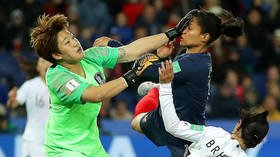You don’t have to be a ‘sexist’ French philosopher to avoid women’s football

If it wants to attract the kind of people who actually enjoy watching sport, women’s football must stop being a grievance-filled political movement for the morally virtuous.
This week controversial French public intellectual Alain Finkielkraut set off a firestorm in France. When asked if he was going to watch the Women’s World Cup, which has begun this week in his homeland, he dared to simply say “I don’t like women’s football.”
He was branded by his TV interviewer as “retrograde” and “condescending” and widely condemned as “sexist” on social media. Finkielkraut gave his critics plenty to pick on, saying “that’s not how I see women” and that their game is “equal but different” (though one could argue these are simply personal aesthetic observations, to which he is entitled).
Also on rt.com ‘Stop with this equality!’: French philosopher hounded for not watching women’s footballBut the bigger point remains: saying that you don’t like women’s football in public is now taboo. Claim the same thing about any other sport – American football, Formula 1, men’s figure skating – you are fine. Say it about this one, and it is a political statement against equality, feminism, progress.
Feminism as a sport
This is no accident – outside the field of play all aspects of the game are presented to the wider audience through an ideological lens.
Also on rt.com ‘Scrub up well, don’t they?’ English FA faces sexism claims over women’s team tweetRead any story of reasonable length about it, and you will inevitably be told that it was once as popular as the men’s game – on the basis of a handful of selected attendances in wartime England a century ago – and was then suppressed by men fearful of its success (though it was restricted in several countries, it is disingenuous to pretend that this was the sole reason for the fact that it remains nowhere near as in-demand as the male game in every single country in the world, whatever the starting conditions).
News articles about the present-day game are most often complaints. Girls not being allowed to play in boys teams, lack of female representation in football bodies, inferior facilities. Or demands, particularly for equal pay, which combine a Marxist understanding of economic fairness, with a litigious desire to benefit from the fruits capitalism has brought to football. The two biggest stories in the run-up to France 2019 were the US women’s team lawsuit to close the “pay gap” with the men’s soccer team – which brings in several times more revenue – and the Australian women’s team demand for equal World Cup prize money with the men, even though the men’s world cup earns billions, and the women’s tournament tens of millions.
Also on rt.com 'Institutionalized gender discrimination': Entire US women's team sues US Soccer over pay gapAll positive developments are justified by a nebulous social purpose. BBC broadcasts wall-to-wall women’s football despite low ratings, the Guardian writes dozens of articles that inevitably invite just a handful of (pre-moderated) comments, and are often disguised so that the careless reader doesn’t realize he is about to click on women’s football. English Premier League football teams are losing millions each year financing loss-making female teams. Sponsors are jumping in, though I would bet that even the vast majority of avid sports fans cannot name ten active female footballers, and fewer that they have seen play.
The overall feeling is that women’s football is a perpetual victimhood and empowerment narrative foisted by the media and corporate elite on an unwilling audience for their own good. Why is it even SO important that this particular women’s sport is played professionally?
Truly inclusive
And in this form, I don’t like it. I don’t like its “worthy” aura and I don’t like that I have to pay more money for the football that I do watch to prop up football that I don’t.
The retort might be that it is not for me. But it doesn’t seem to be for its nominal supporters either: for all the claims about how great it is, almost none of them bother to watch. The average match attendance in the top European leagues hovers between 500 and under 2,000 – less than the fifth tier of the English football pyramid. By far the most successful women’s league, North America’s NWSL, attracts 6,000 viewers a game and on tickets that are a fraction of the cost for a male professional sport. And most alarmingly of all, despite the exponential multiplication of the money and the disproportionate coverage these figures remain stubbornly low, and are falling in as many countries as they are rising. National league TV deals are near non-existent – no one wants to watch from the sofa either. Week to week, outside of the World Cup, this is the nichest of niche sports.
Some will argue that this is simply the ceiling for women’s football, because few want to witness a spectacle that is objectively slower and less skilled than the men’s game. I would disagree, as is evident from the huge interest in a variety of sports where women perform under the same athletic constraints, from athletics to tennis (though female team sports do appear to be a harder sell).
But I would suggest a different approach: why not market it not as a social statement, railing against past injustices from men while living hand-to-mouth from their game, but as an actual sport for sport’s sake. With personalities, athleticism, drama, and yes, even sex appeal. Why not become truly inclusive. Even to men, and those who do not hold the most woke views, the jocks and the obsessives. Why not make women’s football not an obligation, but actual … fun.
By Igor Ogorodnev
Igor Ogorodnev is a Russian-British journalist, who has worked at RT since 2007 as a correspondent, editor and writer.














